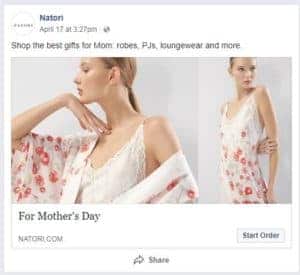Luxury sleepwear designer and manufacturer Natori is using social media marketing to bolster its direct-to-consumer sales.
The 41-year-old brand quietly launched its e-commerce site in 2008. At first, Natori was worried about backlash from its wholesale retail partners for selling direct to consumers. As brands selling direct to consumer became more mainstream, it slowly began to ramp up its digital advertising spending the following year, says Ken Natori, president of Natori.
At first, the brand focused on search ads, but as paid search became more competitive, the retailer wanted to expand its digital marketing mix. The retailer had a presence on social networks Facebook and Instagram but it mainly used those platforms to post to its brand pages with minimal advertising.
The retailer decided that artificial intelligence would be a good fit, as it is a tool that would not need a lot of human touch, Natori says. Artificial intelligence is a machine-learning tool that learns over time the more information that is fed into it.
“Most of our resources are tied up in wholesale efforts,” he says. Sales off of Natori.com, which include Natori products and products it licenses, is roughly 3-5% of its overall business, Natori says.
Natori began using Albert Technologies Ltd., an artificial intelligence marketing platform called Albert, in June 2017.
 Natori uploaded its individual creative assets into Albert, such as product images, advertising images, videos and advertising copy text. That enabled Albert produced different types of ad formats, mixing all of these elements, such as carousel ads or sidebar ads. Natori targets consumers on Facebook and Instagram who have previously purchased on Natori.com or who have visited its site. The retailer also uses the platform’s Lookalike Audiences tool to find shoppers like these, Natori says.
Natori uploaded its individual creative assets into Albert, such as product images, advertising images, videos and advertising copy text. That enabled Albert produced different types of ad formats, mixing all of these elements, such as carousel ads or sidebar ads. Natori targets consumers on Facebook and Instagram who have previously purchased on Natori.com or who have visited its site. The retailer also uses the platform’s Lookalike Audiences tool to find shoppers like these, Natori says.
The machine then produces different ad content and formats and serves the content to consumers. The ads that performed the best were showed to consumers more often—vice versa with the ads that had less engagement.
In the first few months, the retailer’s return on ad spend was between 150-300%, or for every dollar the retailer put in, it would yield $1.50 or $3 in sales. But now, as Albert has learned over time, the returns reach up to 700%, Natori says.
“Every month our return on ad spend has gotten better and better,” he says.
Those results have led the retailer to launch more “upper funnel campaigns,” in which it attempts to acquire new customers and casts a wider net in its targeted audience, Natori says.
In the fall, however, the retailer realized that many of the ads Albert served were promotional or touting sales. “Which made sense from the computer’s point of view that those ads were converting the best,” Natori says. As a luxury brand, however, that was not the image that the retailer wanted to portray to shoppers.
“A potential downside with AI is that you lose a little bit control,” Natori says.
And so, the retailer had to make new rules within the algorithm to set a threshold for how many sale ads it could serve. Even though this could in theory lower its return on ad spend, this was better overall for its brand image, Natori says.
Since it is producing so many more ads, Natori has ramped up its creative production with the agency it uses. The retailer’s budget has increased 20% year over year for creating content. While Albert is “the biggest consumer” of the new content, the creative also feeds into the retailer’s organic social posts and paid search.
Paid social went from almost nothing to now about 25-30% of its digital marking budget, with paid search including ads on YouTube and Google Shopping and text ads largely making up the rest.
“The [paid search] field gets more and more competitive every year. Honestly, our return on ad spend, it’s just more challenging to keep the same number,” Natori says. “By far what we are doing on Albert is our best performing advertising category.”
 The vendor takes a percentage of each sale and there is no implementation fee, Natori says. The retailer’s digital marketing manager does most of the leg work for managing Albert, however, the director of e-commerce and e-commerce assistant also are involved.
The vendor takes a percentage of each sale and there is no implementation fee, Natori says. The retailer’s digital marketing manager does most of the leg work for managing Albert, however, the director of e-commerce and e-commerce assistant also are involved.
Because the retailer minimally experimented with paid social ads, Natori doesn’t know how much of an impact artificial intelligence played into this channel’s success. Although, he would guess that the retailer wouldn’t have generated as high of a return as quickly. Overall, he says, there was “no meaningful downside” to using artificial intelligence.
